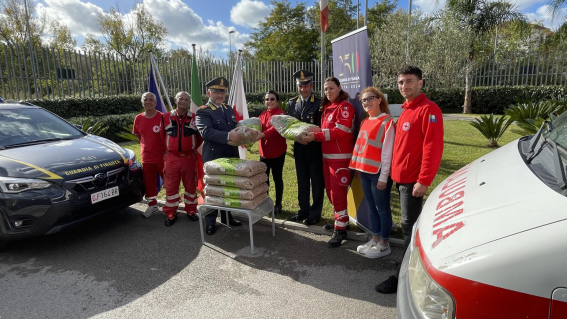The Financial Police of Salerno donated to the Italian Red Cross of Agropoli beyond 5mila kg in pellets. The fuel had been seized as part of an activity to combat counterfeiting and illegal trading carried out by the Fiamme Gialle of the Agropoli Company because it was displayed for sale with misleading indications regarding its real characteristics, so that unaware consumers could have stumbled upon purchasing products with low calorific value at the price of those with higher capacity energy.
The judicial authority, at the request of the financiers, having identified the actual need and safe use of a humanitarian purposes of the seized goodsthus arranged the donation of the entire amount 336 packs of pelletsweighing 15 kg each, to the neediest citizens of the community. Upon delivery, which took place in headquarters of the Agropoli Companyrepresentatives of the voluntary association who work daily for the less fortunate and the military who carried out the kidnapping were present.
#Agropoli #Guardia #Finanza #donates #seized #pellets #Red #Cross
–
**1. Recognizing the unique nature of this news story, what are the potential long-term impacts of this collaboration between the Salerno Financial Police and the Italian Red Cross of Agropoli on similar situations in the future?**
## World Today News: Pellets for People – An Interview
Welcome to World Today News. Today, we delve into a unique story of resource redistribution, focusing on a recent donation made by the Salerno Financial Police to the Italian Red Cross of Agropoli. Joining us are two guests: *[Guest 1 Name]*, representative from the Salerno Financial Police, and *[Guest 2 Name]*, representative from the Italian Red Cross of Agropoli.
**Section 1: The Seizure and its Impact**
* **[To Guest 1]:** Can you walk us through the circumstances leading to the seizure of the pellets? What were the key concerns that prompted your investigation?
* **Follow-up (if needed):** Could you elaborate on the methods used by these sellers to deceive consumers? How prevalent is this type of deceptive practice in the pellet market?
* **[To Guest 2]:** What are the typical challenges faced by the Italian Red Cross in Agropoli, especially regarding accessing essential resources like heating fuel during the winter months?
* **Follow-up (if needed):** How does this donation specifically address these challenges and benefit the community you serve?
**Section 2: From Confiscation to Compassion**
* **[To Guest 1]:** The decision to donate the seized pellets instead of pursuing their destruction is noteworthy. Can you shed light on the factors influencing this choice and the legal process behind it?
* **Follow-up (if needed):** How does this case reflect the broader values and priorities of the Financial Police when it comes to dealing with confiscated goods?
* **[To Guest 2]:** How do charitable organizations like yours usually acquire resources for those in need? What were your initial reactions when notified about this unusual donation from the Financial Police?
* **Follow-up (if needed):** What message does this collaboration between law enforcement and humanitarian organizations send to the community?
**Section 3: Looking Ahead – Addressing the Root Causes**
* **[To both Guests]:** This case highlights the vulnerability of consumers, particularly those facing economic hardship. What concrete steps can be taken to prevent similar incidents of deceptive practices and protect vulnerable consumers in the future?
* **[Open discussion]:** How can government agencies, businesses, and community groups work together to ensure access to affordable and reliable heating resources for all citizens, regardless of their financial circumstances?
**Closing Remarks:**
Thank you both for sharing your valuable insights. This story reminds us that innovative solutions can emerge from unexpected circumstances, bridging the gap between law enforcement and humanitarian efforts to create a more just and compassionate society. We hope this interview will spark further discussion and action on addressing the challenges of energy accessibility and consumer protection.

